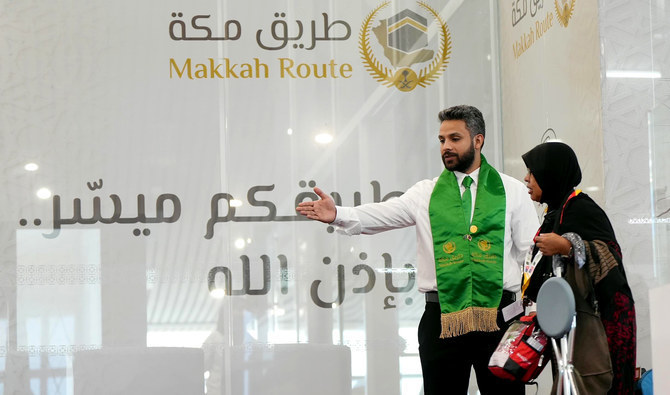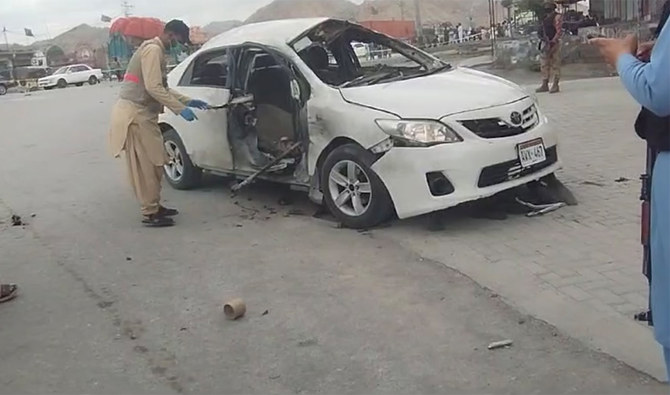ISLAMABAD: There are currently around 25,000 coronavirus testing kits available in Pakistan, the country’s health minister has said, raising fears that a shortage of vital equipment may hamper the government’s ability to slow the advance of the coronavirus outbreak.
The World Health Organization called on all countries on Monday to ramp up their testing programs as the best way to slow the advance of the coronavirus pandemic. Without testing, it said, cases cannot be isolated and the chain of infection will not be broken.
Around a million Pakistanis have been screened for fever with thermometer guns and checked for signs of a cough or difficulty in breathing, common symptoms of the coronavirus, at entry points to the country.
But to estimate the true size of the outbreak in Pakistan, testing for the virus itself must become widely available.
Between the provincial and the federal governments, Pakistan currently has about 25,000 kits at hand and had placed a number of large orders, including for more than 100,000 kits from Canada, Dr. Zafar Mirza, State Minister of Health of Pakistan, told Arab News in an interview late on Sunday evening.
However, he said the country would “within weeks” be able to produce its own testing equipment.
“We are also buying a synthesizer … which is a technology through which you can produce [testing kits] yourself,” Mirza said. “So then you become self sufficient.”
Fewer than 500 Pakistanis have as yet been tested for the coronavirus, the health minister said, raising concerns about missed chances by the government to ensure more widespread testing during the early days of the outbreak which could make containment easier.

A paramedic staff stands outside an isolation section, set up for the precautionary measures for the coronavirus patients treatment at the Jinnah Postgraduate Medical Center (JPMC) in Karachi, Pakistan February 3, 2020. (REUTERS)
Pakistani health officials put the tally of confirmed cases of the novel coronavirus, which causes the disease known as Covid-19, at more than 180 on Tuesday morning. The first confirmed case in Pakistan emerged on February 26.
Experts say they have no way of knowing the true national figures because access to testing is severely limited at present in the nation of 208 million people. They have also faulted Pakistan’s narrow testing criteria.
Currently, individuals with flu-like symptoms are only tested if they have traveled to a country where the virus is spreading, triggering fears there are far more cases in Pakistan than currently recorded, which could become an enfeebling weakness in Pakistan’s response effort in the coming weeks.
By this point in its outbreak, South Korea — where a downward trend in daily cases has raised hopes that Asia’s biggest epidemic outside China may be slowing — had tested more than 100,000 people for the disease, and was testing roughly 15,000 people every day.
“I think we are nearing around more than 400,” Mirza said on Sunday evening when asked how many people had been tested for the coronavirus so far.
The minister explained that only people who had returned from travel to countries where the virus had spread, and people who returning travelers had interacted with, and who in turn developed “signs and symptoms” similar to the coronavirus infection, were being tested.
“Apart from this, nobody needs testing,” Mirza said.
When asked about reports that officials at a 1166 helpline set up to assist citizens who suspected they had coronavirus-type symptoms were discouraging people from getting tested unless they had traveled to virus-hit countries, Mirza said:
“They should be discouraged … Over here, every person who has a cold suspects that they have coronavirus and says why don’t I get tested; they will exhaust all our [testing] kits.”
Mirza said no senior government officials were currently at risk from the virus and denied reports of two deaths in Sehwan city in the southern Sindh province, where 155 of Pakistan’s total have been confirmed.
Pakistan borders China and Iran, both of which have been badly hit by the virus. Pakistan reported its first locally contracted case on Friday, though officials say most Pakistanis with infections had recently traveled to Iran.
Last week, Pakistan announced it would temporarily shut all land borders and limit international flights and public gatherings to halt the spread of the disease.
Mirza said Pakistan had tracked and screened around 6,000 Pakistanis who had returned from Iran since February and knew about the whereabouts of all incoming travelers: “Each one of them,” he said. “Absolutely.”
Responding to reports in Chinese media which quoted Chinese foreign ministry officials saying Pakistan had donated its entire inventory of protective masks to China after the coronavirus first broke out there late last year, the minister said:
“This is nonsense … The world is going through an outbreak. Can a country be so irresponsible that they send all their protection equipment to another country?”
The minister could not provide specific figures for how many beds had been assigned for coronavirus patients across the country but admitted that there was a shortage of ventilators.
According to 2014 data from the World Health Organization, Pakistan has 0.60 hospital beds per 1,000 people. Indeed, like most South Asian countries, the nation’s health care infrastructure is ill-equipped to deal with any large-scale emergency.
Mirza said the prime minister had approved a request for Rs5 billion to be used by the National Disaster Management authority to combat the spread of the virus. Six provincial disaster management bodies had around rupees two billion each, he said, and would get additional financial support from the provincial governments on an as-needed basis.
“And then, at the same time, we have been approached by different multilateral and bilateral agencies, development partners,” Mirza said. “So we are talking about roundabout $200 million dollars, which have been offered to us by World Bank, Asian Development Bank, different brotherly countries.”
Speaking about the government’s communication strategy, he said health officials had been using television channels to send out public service messages about the disease daily and from Monday (today), advertisements would begin appearing in national dailies educating people about symptoms and prevention. A new website for the health ministry and a dashboard, which would provide real time numbers of cases, would also be uploaded on Monday, Mirza said.
He also said Facebook had agreed to give ad credits worth $50,000 to the government for coronavirus-related awareness campaigns.
Mirza said Pakistan had set up ten “disease surveillance units” across the country, comprising rapid response teams and others, and “few hundreds” of people were now involved in screening and contact tracing efforts. Paramilitary Rangers had also been deployed at the Karachi, Lahore and Islamabad airports since last week so screening of passengers could be done in a “disciplined way,” he said.
“No country is equipped to face an outbreak like this,” Mirza said when asked if Pakistan’s leadership and medical infrastructure was ready to contain the virus if it spread more widely. “It’s an imminent threat, imminent risk that we are running at the moment, and we are trying, according to our resources, to do our best.”
When asked if Pakistan would declare a national health emergency in the near future over fears the virus could spread, the minister said: “No need.”
















